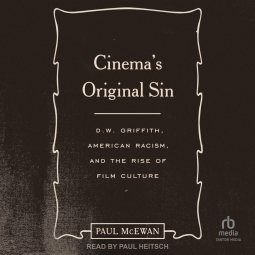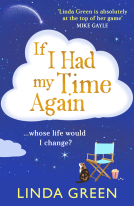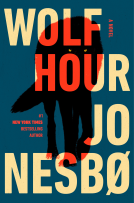Please wait... This may take a moment.
Cinema's Original Sin
D.W. Griffith, American Racism, and the Rise of Film Culture
by Paul McEwan
Narrated by Paul Heitsch
This title was previously available on NetGalley and is now archived.
Pub Date
Dec 13 2022
| Archive Date
Dec 13 2022
Thank you! Your input is valuable to us, and will be shared with the publisher.
Please sign in to submit your valuable feedback.
Sign In or Register Now.
Description
For over a century, cinephiles and film scholars have had to grapple with an ugly artifact that sits at the beginnings of film history. D. W. Griffith's profoundly racist epic, The Birth of a Nation, inspired controversy and protest at its 1915 release and was defended as both a true history of Reconstruction (although it was based on fiction) and a new achievement in cinematic art. Paul McEwan examines the long and shifting history of its reception, revealing how the film became not just a cinematic landmark but also an influential force in American aesthetics and intellectual life.
In every decade since 1915, filmmakers, museums, academics, programmers, and film fans have had to figure out how to deal with this troublesome object, and their choices have profoundly influenced both film culture and the notion that films can be works of art. Some critics tried to set aside the film's racism and concentrate on the form, while others tried to relegate that racism safely to the past. McEwan argues that from the earliest film retrospectives in the 1920s to the rise of remix culture in the present day, controversies about this film and its meaning have profoundly shaped our understandings of film, race, and art.
Contains mature themes.
For over a century, cinephiles and film scholars have had to grapple with an ugly artifact that sits at the beginnings of film history. D. W. Griffith's profoundly racist epic, The Birth of a...
Description
For over a century, cinephiles and film scholars have had to grapple with an ugly artifact that sits at the beginnings of film history. D. W. Griffith's profoundly racist epic, The Birth of a Nation, inspired controversy and protest at its 1915 release and was defended as both a true history of Reconstruction (although it was based on fiction) and a new achievement in cinematic art. Paul McEwan examines the long and shifting history of its reception, revealing how the film became not just a cinematic landmark but also an influential force in American aesthetics and intellectual life.
In every decade since 1915, filmmakers, museums, academics, programmers, and film fans have had to figure out how to deal with this troublesome object, and their choices have profoundly influenced both film culture and the notion that films can be works of art. Some critics tried to set aside the film's racism and concentrate on the form, while others tried to relegate that racism safely to the past. McEwan argues that from the earliest film retrospectives in the 1920s to the rise of remix culture in the present day, controversies about this film and its meaning have profoundly shaped our understandings of film, race, and art.
Contains mature themes.
Advance Praise
"With an impressive scope and a novel approach, Cinema's Original Sin contains many insights and details that even readers who are well-versed in American film history will find revelatory." —Allyson Nadia Field, author of Uplift Cinema: The Emergence of African American Film and the Possibility of Black Modernity
"Cinema's Original Sin arrives at a moment when the need to grapple with the instruments of racism and their history has never been more pressing. It resolutely ties The Birth of a Nation to our present period of contestation and emerges all the stronger and more relevant for grappling with the challenges that this canonized work presents." —Charlie Keil, editor of A Companion to D.W. Griffith
"With an impressive scope and a novel approach, Cinema's Original Sin contains many insights and details that even readers who are well-versed in American film history will find revelatory." —Allyson...
Advance Praise
"With an impressive scope and a novel approach, Cinema's Original Sin contains many insights and details that even readers who are well-versed in American film history will find revelatory." —Allyson Nadia Field, author of Uplift Cinema: The Emergence of African American Film and the Possibility of Black Modernity
"Cinema's Original Sin arrives at a moment when the need to grapple with the instruments of racism and their history has never been more pressing. It resolutely ties The Birth of a Nation to our present period of contestation and emerges all the stronger and more relevant for grappling with the challenges that this canonized work presents." —Charlie Keil, editor of A Companion to D.W. Griffith
Available Editions
| EDITION |
Other Format, Unabridged
|
| ISBN |
9798765027325 |
| PRICE |
$19.99 (USD)
|
| DURATION |
9 Hours, 20 Minutes |
Additional Information
Available Editions
| EDITION |
Other Format, Unabridged
|
| ISBN |
9798765027325 |
| PRICE |
$19.99 (USD)
|
| DURATION |
9 Hours, 20 Minutes |
Average rating from 5 members
Readers who liked this book also liked:
Trapped in Time
Lee Hardesty
Historical Fiction, Sci Fi & Fantasy, Teens & YA
The Invisible Woman
James Patterson; Susan DiLallo
General Fiction (Adult), Mystery & Thrillers
Wolf Hour
Jo Nesbo
General Fiction (Adult), Mystery & Thrillers
Shards
Jack Wakefield
Literary Fiction, Sci Fi & Fantasy
Dollface
Lindy Ryan
General Fiction (Adult), Horror, Mystery & Thrillers




















